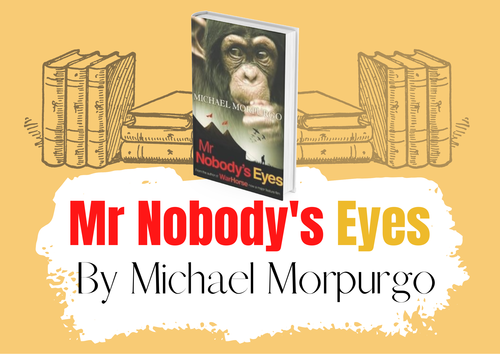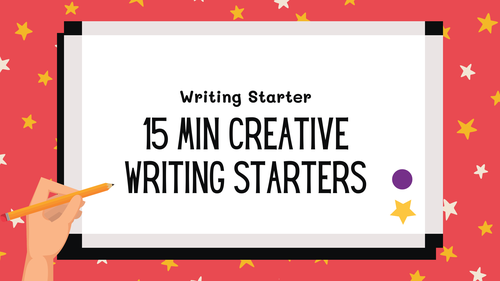101Uploads
10k+Views
1k+Downloads
All resources

Mr Nobody's Eyes Michael Morpurgo Novel Studies
This scheme of work provides lesson for the full novel of Mr Nobody’s Eyes by Michael Morpurgo.
It covers a range of reading skills throughout e.g.
prediction
comprehension
main ideas
summarising
metalinguistics
Character visualisation
key themes
evaluations

15min Writing Starter Resource
This resource contains a variety of 15 min writing ideas for learners across a variety of genres.

Literacy Starters
This literacy starter resource contains 20 different starter activities. It provides a range of starters across a variety of literacy genres. It has tasks related to spelling, grammar, writing and listening & talking. The starter aims to revise and consolidate common issues which revise in literacy for learner in KS2. It looks at issues such as homophones, proof reading, direct speech and many other areas. All activities are short and can be completed on whiteboards. Many starters also contain a challenge task for more able learners.
It contains 20 different starter activities.

Decimal Thousandths
This lesson teaches and visually demonstrates different ways of modelling decimal thousandths.
It also shows how to expand decimals in a written form.
This resource works well with an interactive whiteboard as there are lots of opportunities for learners to write on the resource.
There is also a Guessimal game which learners love. A learner must choose one of the decimal numbers and the other learners have 7 chances to try guess the chosen decimal. They must ask questions like:
Is there a 5 in the tenths column?
Is there an even number in the units?
Does your decimal have any hundredths?

Singular and Plural Nouns Grammar Lesson
Short grammar lesson singular and plural nouns. Includes a QR to a game that learners could play and includes some written tasks.

Adverbs Grammar Lesson
Short lesson on using adverbs. Lesson encourages learners to use adverbs at different parts of the sentence e.g. beginning, middle and end.

Maths: Probability
This resource explains what probability is then explains the language used for probability e.g. Certain, likely, impossible etc.
It gives a few examples which encourage the children to use this language. It then goes on to show how we can use fractions, decimals and percentages to show probability and it provides a few examples of this.
Bundle

Spooky Creative Writing Bundle
This bundle helps learners create spooky characters and settings using descriptive language and figurative language. Once learners have learned how to create a spooky character/setting, they could have a go at writing a full spooky story using the Roll a Story resource.

Maths Revision Code Breaker
This resource contains two code breaker to revise key numeracy and maths topics across upper primary/KS2.
Answers are included

Adverbial Phrases
Short grammar input on adverbial phrases and the different types of adverbial phrases. Short written activity to be completed at the end.

Persuasive Letter To Santa
This resource teaches learners how to use persuasive strategies and use these to create a persuasive letter to Santa.
It discusses the effect of different persuasive devices then provides a modeled letter that can be the basis of class discussion for learners to identify the strategies used and the effect they have. It also models the correct layout of a letter.

Instructional Writing
This resource revises what instructional writing is and the different kind of instructions we can get. It then goes on to model the layout and key features of an instructional text.
The resource models a text on how to make fairy cakes, however this could be used as an example and changed.
At the end of the resource there a few slides showing learners how to improve their instructions by adding in sentence openers, powerful verbs, adverbs and adjectives.

Converting 12 and 24 hour time
This resource works best with an interactive whiteboard that learners can write on. It can also be adapted for use on Seesaw or other online platforms.
This resource begins with a time conversions starter quiz on units of time.
It then begins by explaining the key differences between 12 and 24 hour time.
It then provides digital clocks for learners to practise converting between the two different formats.
It has ten practice questions for learners to try independently.
Finally, it progress to using analogue and digital clocks and writing times in both 12 and 24 hour format. This challenges learners and provides good assessment of which areas of time learners find challenging.
A template for these slides is available which can be printed for learners to write on directly either with pencil or work well with smart pals or wallets.

L'Halloween - Halloween French Vocab Resource
This resource teaches some key Halloween French vocabulary. It then contains links to 6 different games via QR codes. Pupils can play the games independently by scanning the QR code or the games can be played as a whole class on an interactive whiteboard by clicking on the QR codes (they are hyperlinks).
There are also 4 follow up worksheets that learners can choose from.

Decimal Thousandths Powerpoint
This resource revises the place value of a number up to decimal thousandths.
It then briefly covers partitioning/expanding of decimal numbers and ordering decimal numbers. It contains links to two games that can be played on an interactive whiteboard with learners.

Don't use... Synonym Posters
This is useful resource to encourage learners to use better synonyms of words. Learners can use these independently to improve their writing.

Alphabet Exercises
This is a great resource to get learner’s moving. This can be used during PE or as a home learning resource. Pupil’s must spell out their names and complete the exercise for each letter. This can be made more challenging by asking them to spell out first and second name or by spelling out a friend’s name if they finish quickly.

French Greetings & Introductions Role Play Cards
This resource can be used to encourage children to practise their french greetings and introductions. Each child is given a card with a character. There are a number of games you can play with these cards e.g. FInd your pair, find someone the same age, find someone who lives in the same country or other characters born in the same month.
These cards can be used in multiple French lessons such as names, ages, locations and birthdays.




















